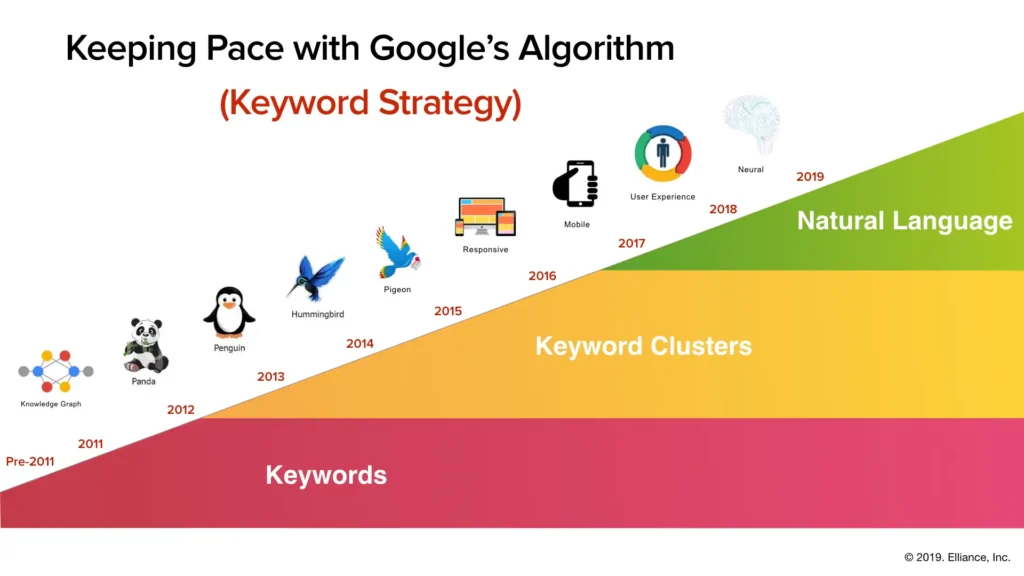Staying on top of Google’s algorithm updates is no longer optional for marketers—it’s essential. In 2025, with search behavior more nuanced and competition higher than ever, Google’s search engine algorithm has evolved into a sophisticated ecosystem powered by AI, user signals, and content integrity.
This article breaks down what you need to know about Google’s latest algorithm updates in 2025, how they impact your digital marketing strategy, and how to stay ahead in the ever-changing SEO landscape.
What Is the Google Algorithm?
At its core, the Google algorithm is a complex set of rules and calculations that determine which pages appear in search results and in what order. Google uses hundreds of ranking factors to evaluate a website’s relevance, trustworthiness, user experience, and content quality.
Every year, Google rolls out multiple updates, some minor, some massive, that can dramatically affect your site’s ranking, traffic, and visibility.
Google Algorithm Trends in 2025

In 2025, Google has become even more focused on user-first search experiences, AI-generated content control, first-party data, and content authority. Here are the five most influential updates and trends this year:
- Search Generative Experience (SGE) Becomes Core
Google’s Search Generative Experience (SGE), introduced in late 2023, is now a central part of search results. Using generative AI, SGE provides direct, conversational answers to search queries, often pulling from multiple sources and summarizing them.
What this means:
- Featured snippets are evolving into more detailed AI-generated summaries.
- Organic clicks are dropping on traditional SERP links as users get answers directly.
- Brands must optimize for inclusion in AI answers by focusing on structured data, FAQs, and authority-building.
- Helpful Content System 3.0
Google’s Helpful Content System has been refined in 2025 to better identify and prioritize:
- Human-written, experience-driven content
- Pages that demonstrate first-hand expertise and genuine value
- Original content over rephrased or mass-generated articles
What this means:
- Avoid relying solely on AI for content generation.
- E-E-A-T (Experience, Expertise, Authoritativeness, Trust) is now more influential than ever.
- Long-form content with clear value and real insights ranks higher.
- AI Content Watermarking and Detection
To combat the flood of low-quality AI content, Google now uses AI watermarking detection algorithms to identify content that has been entirely generated by machines without editing or oversight.
What this means:
- Marketers using AI tools like ChatGPT or Gemini must fact-check, personalize, and refine content before publishing.
- Originality and brand voice matter more.
- Google penalizes content with poor structure, repetition, or no added value.
What Marketers Should Do before the end of 2025
- Double Down on E-E-A-T
- Show first-hand experience in your content.
- Use author bylines and bios to establish authority.
- Link to credible sources and data points.
- Create “Experience-Based” Content
- Case studies, tutorials, opinion pieces, interviews, and data-driven reports stand out.
- AI-generated summaries are helpful but must be backed by real insight.
- Optimize for Featured & AI Snippets
- Answer questions directly in your content (eg. “What is…” “How to…”).
- Use bullet points, lists, tables, and FAQs.
- Add structured data markup to improve clarity for Google’s crawlers.
- Enhance User Experience
- Ensure your site is fast, clean, responsive, and visually stable.
- Avoid excessive pop-ups or intrusive ads.
- Use intuitive site architecture and internal linking.
- Leverage First-Party Data
- Build email lists and customer insights using your own channels.
- Rely less on cookies, more on intent-based content and behavioral analytics.
Recommended Tools to Stay Updated
- Google Search Console: Monitor performance and get alerts.
- SEMrush / Ahrefs: Track keyword changes, competitor movements, and backlink health.
- Surfer SEO / Frase: Improve content based on top-ranking pages.
- PageSpeed Insights / GTMetrix: Optimize your site’s performance and meet Core Web Vitals benchmarks.
Conclusion
Google’s 2025 algorithm updates reflect a broader industry trend: prioritizing quality, experience, and trust over gimmicks and automation.
To succeed in SEO today, marketers must create genuine, helpful content, embrace user-centric design, and stay adaptable as search evolves into a richer, more AI-integrated experience.
Search isn’t dead, it’s just changing. And those who adapt early will be the ones who rank, convert, and grow.

